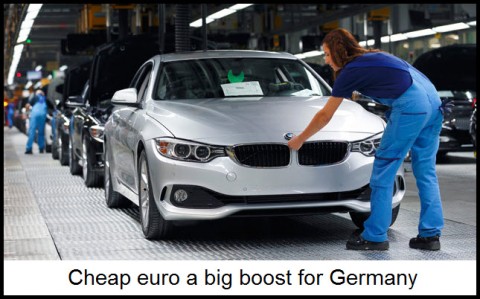Rick’s Picks shifts to a new format this week with a Question of the Week instead of an essay. This week’s question: How do you see Europe’s attempt at quantitative easing playing out? Between now and September 2016, the European Central Bank plans to purchase $68.76 billion of sovereign bonds each month, for a total of more than $1.2 trillion. It is a foregone conclusion that the program will fail, and badly, for several reasons. For one, unlike Americans, the European consumer’s credo is not “shop till you drop.” That’s why easy credit is unlikely to result in the binge-buying of homes, cars and big-ticket appliances such as we have come to expect in the U.S. And for two, European companies have even less reason to borrow for expansion than their American counterparts. The latter have used a large portion of the money they’ve borrowed for practically nothing to buy back their own shares. More than revenue growth itself, this financial perpetual motion machine is what has sustained the bull market on Wall Street since 2009.

The effect has been heightened by cheerleading Keynesians and a credulous, economically ignorant news media that have bought into the recovery story, even if the board middle class, whose wages have remained stagnant, has not. Europeans will be tougher to convince, however, since, German car-exports aside, there are no sources of economic strength – even false strength — big enough to float Europe’s boat. What Europe’s bourses lack is an Apple or a Google to help keep share prices pumped. Far from joining in the party, European regulators have been trying to suppress the growth of Apple and Google with lawsuits and regulations. This is anti-business-as-usual in Europe, and it is unlikely to create even the fraudulent kind of economic “strength” and “prosperity” we’ve seen in the U.S., let alone real growth.

For the question raised, we have to realize that the reason for all the buybacks in US was that the people who are in control of these companies are starting to the writing on the wall and prepare for the coming collapse and war. They sell their shares to their own corporations, since the corporations will have to die anyway. I hear that this isn’t the end yet, and that much, much more share buybacks are still to come, as the majority isn’t seeing the writing yet even now.
So, in Europe, are they just as smart to understand that there is no way out? Do they understand that it’s time to start crating a “disaster portfolio” by carefully selling to unsuspecting all the junk that can’t be taken to the other side of the war safely? I doubt it.
Just like in China they are not on the edge of thinking and had never been. They think by yesterday headlines. So, I agree that all that QE will be used to buy US Treasuries instead, and so the sucking hurricane into the US in order to pump it up for the subsequent explosion must continue to increase.
For the question of coming world depopulation, I have a slightly different view. First, what is the population problem? It’s two-fold:
a) in developed countries, the cost of population increase is currently shifted to everyone by counterfeit currency schemes.
b) the cost of sustaining additional children has been lower than median recently everywhere in the world, due to increased production in capitalist countries.
Consequently, as the counterfeit money regime collapses, this will severely affect the division of labor and thus the efficiency of production must immediately and significantly fall, i.e. the cost of production must increase. This will increase if not multiply the cost of raising children worldwide. This factor will affect all countries, but as trade disappears it will affect (food) producing countries less.
Secondly, in developed countries, the cost of raising children (and maintaining elders) will suddenly stop being socialized due to the collapse of inflation mechanism and this will result in a price shock on top of the above mentioned worldwide price increase.
Thus, I don’t think that the developing countries will suffer the most population decrease. Their product is low tech, and they will continue to have food, while the developed countries will lose the high tech market due to loss of money, and the loss of the division of labor will seal their fate, i.e. such loss impacts high tech production more than it impacts low tech production.
So, if China and India lose one third to a half of their populations, countries like USA and Germany will suffer 70-80 % population decrease.